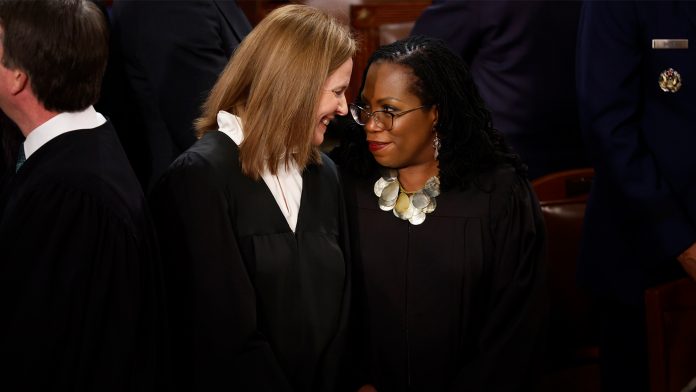Was the Supreme Court’s decision in the birthright citizenship case a proper curb on judicial overreach, or a step toward the end of America’s system of justice? That’s the gist of a dispute between Justices Amy Coney Barrett and Ketanji Brown Jackson. Barrett wrote the majority opinion in the 6-3 ruling, and Jackson published a withering dissent in the court’s Trump v. CASA decision released Friday, June 27.
The Supreme Court granted the Trump administration a stay, allowing it to, in part, implement the president’s executive order ending birthright citizenship, the long-established principle that any child born in the United States automatically becomes a citizen. The case is not yet over, as the court did not address the constitutionality of the executive order. Instead, it limited the power of federal district judges to block presidential actions on a nationwide basis.
Within the ruling was a debate between Barrett and Jackson for the world to read.
‘Enabling our collective demise’
In her dissent, Jackson wrote that the court was obligated to uphold the rule of law and, therefore, should not grant Trump any leeway in enforcing his birthright citizenship executive order.
Then she went a step further and said the conservative majority’s decision could contribute to the end of America’s system of government.
“Perhaps the degradation of our rule-of-law regime would happen anyway,” she wrote. “But this Court’s complicity in the creation of a culture of disdain for lower courts, their rulings and the law (as they interpret it) will surely hasten the downfall of our governing institutions, enabling our collective demise.”
“Tragically, the majority also shuns this prescient warning: Even if ‘[s]uch institutions may be destined to pass away,’ ‘it is the duty of the Court to be last, not first, to give them up,’” Jackson added.
‘Startling line of attack’
Barrett took issue with Jackson’s rhetoric and described her legal position as difficult to pin down. She supposed that Jackson was arguing that universal injunctions are appropriate or even required when the defendant is a member of the Executive Branch. Barrett said that goes well beyond the mainstream defense of universal injunctions.
“We will not dwell on JUSTICE JACKSON’s argument, which is at odds with more than two centuries’ worth of precedent, not to mention the Constitution itself,” Barrett wrote. “We observe only this: JUSTICE JACKSON decries an imperial Executive while embracing an imperial Judiciary.”
Further criticizing Jackson’s reasoning, Barrett said her colleague’s words amounted to a “startling line of attack” that is not tethered to “any doctrine whatsoever.”
“Waving away attention to the limits on judicial power as a ‘mind-numbingly technical query,’ she offers a vision of the judicial role that would make even the most ardent defender of judicial supremacy blush,” Barrett wrote. “In her telling, the fundamental role of courts is to ‘order everyone (including the Executive) to follow the law—full stop.’”
Trump appointed Barrett to the court in 2020. President Joe Biden appointed Jackson in 2022.
‘A republic, if you can keep it’
Justice Sonia Sotomayor, who wrote the principal dissent in the case, alluded to Benjamin Franklin’s famous quote, “A republic, if you can keep it.”
“The rule of law is not a given in this Nation, nor any other,” Sotomayor wrote. “It is a precept of our democracy that will endure only if those brave enough in every branch fight for its survival. Today, the Court abdicates its vital role in that effort. With the stroke of a pen, the President has made a ‘solemn mockery’ of our Constitution. Rather than stand firm, the Court gives way. Because such complicity should know no place in our system of law, I dissent.”
Barrett wrote that no one disputes that the executive must follow the law. But she added the judicial branch does not have unbridled authority to enforce this obligation.

